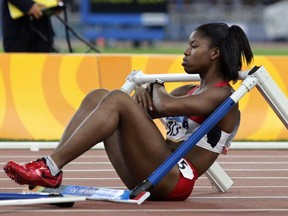Postmedia may earn an affiliate commission from purchases made through our links on this page.
Fitness
Fitness: Mind games make competition at Olympics unpredictable

Every athlete, no matter how seasoned, will get Olympic-size jitters before competing in the Games.
Article content
As much as we marvel at spectacular gold medal performances, every Olympics has its share of dramatic upsets where athletes favoured to medal never make it to the podium.
“Sometimes athletes don’t achieve their goal,” said Jean Francois Ménard, mental performance coach and author of Train Your Brain Like an Olympian. “That’s why we love sports so much. They’re unpredictable.”
Advertisement 2
Article content
Ménard says the pressure of the Olympics Games is like no other competition. It starts when the Olympic year begins and amplifies the closer it gets to the flame being lit.
For years, athletes were left on their own to handle the stress. But, these days, most athletes and sports federations use the services of mental performance coaches like Ménard to help deal with the pressure to succeed while the world is watching. Tools like self-talk and imagery are used to sharpen focus and the importance of establishing a familiar routine is ingrained into their competition readiness tool kit.
Still, there’s no denying every athlete, no matter how seasoned, will get Olympic-size jitters before competing. But nerves aren’t the enemy. They’re nothing more than a signal the body gives when something important is coming up. They’re also source of energy that can be tapped and used to the athlete’s advantage. This is when self-talk and imagery come into play. Athletes use mantras to create a sense of calm and control and imagery to play the race in their head and sharpen their focus. The idea is to, as Ménard says, “turn an ‘oh sh** moment into an ‘oh yes’ moment.”
Advertisement 3
Article content
“The same nerves athletes feel at the Games are the same they feel before every competition, just amplified,” Ménard said.
Still, there’s no doubt the Olympics makes the stakes higher. Athletes spend four years gearing up for their Olympic moment. And from the time they enter the Olympic Village, there’s no doubt this event is like none other
The athletes’ village, Canada House, a cafeteria where superstars like LeBron James break bread alongside a teenager experiencing their first Olympics, is what makes the Games so special. It’s distractions like these that make athletes lose focus, so Ménard coaches Olympians to concentrate on the familiarity of the competition venue, instead of the myriad of distractions that make up the Olympic Games. Pools, tracks, courts and fields are places where athletes feel most at home, regardless of whether they’re at the Olympics or their local training centre.
Still, stuff happens. Athletes trip, miss dives, blow a landing, false start and go out too fast. But athletes choking in the face of pressure isn’t unique to the Olympics. It just gets more visibility given the intense media coverage that accompanies every Games. Greg Louganis hitting the diving board, Perdita Felicien crashing into a hurdle, speedskater Jeremy Wotherspoon falling a few strides from the start line and swimmer Ryan Lochte blowing a half-length lead on the anchor leg of the men’s 4×100 metre freestyle are ingrained in our memories even decades after they occurred.
Advertisement 4
Article content
For some athletes one mistake means the end of their Olympics. Others have a second chance to reach the podium. According to Ménard, a poor performance isn’t a harbinger of things to come, but rather a chance to correct mistakes and refocus efforts on the next opportunity to excel.
“When things go too well, it’s just as dangerous as when things don’t go as planned,” he said.
Whether athletes under or over perform, Ménard says the conversation should focus on execution, not the result. In the case of a win, athletes need to highlight what is going right and maintain that momentum. If things didn’t go as planned, they need to refocus on the details needed to execute their game plan.
“They need to put themselves in a position where they are doing what have to do to succeed,” Ménard said.
The ideal is to find that flow state where athletes perform best. A much-studied phenomenon, flow is when athletes are so focused on the task at hand everything else falls by the wayside. Distractions and self-doubt are absent, and a sense of effortless and hyper concentration takes over. One of the hallmarks of finding flow is having confidence in the skills, training and preparation that got the athlete to the Games. The more those skills are up to the challenge, the greater the chances the athlete will do what they spent the last four years training to do.
Watching on TV, we often get a sense of just how focused an athlete is prior to competing. We can also spot a bad case of performance anxiety. But that’s what makes the Olympic Games so special. Some athletes rise to the occasion and some fall victim to all the hype. And it’s not always the most seasoned athletes who handle the pressure best. Seeing a teenager walk up to their event without a care in the world and put down a gold medal performance has the world cheering. An Olympic fail has the world cringing. But it’s exactly those moments that makes the Olympic Games so special.
Recommended from Editorial
Advertisement 5
Article content
Article content










